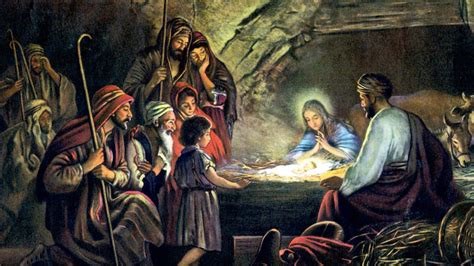The Pastor’s Page December
This year’s Christmas sermon will focus on the poverty of Christmas. It may sound like a peculiar theme given the excess of the season. Lights are everywhere taxing our overburdened electrical grid. Decorations are evermore elegant and elaborate and come with an ever increasing price tag. And don’t get me started on the trees—no seriously, I think there’s a forest of artificial trees populating my home. Then there’s the presents bigger and bigger piles reaching into every inch of airspace left underneath the tree. With the presents boom came some mad genius—or infamous marketer—who designed an inverted Christmas tree—the idea being there would then be more room under the tree for presents.
Don’t get me wrong. I’m not some poor Ebenezer—the Dickens’ character and not the original altar by that name in I Samuel 7:12—whose heart is hardened to the cultural as well as religious themes of the season. I want to give lavish gifts to friends and family. Nothing brings joy to my soul like hot cocoa and a Christmas cookie or two…or three. The songs of the season—both sacred and secular—warm my heart and bring a tear to my eye.
And here I am getting off track as so easily we can do in this season of Christmas. Of course naming the season Christmas means that I have forfeited the fight to reclaim Advent and to have Christmas start on the 25th and continue for the next 12 days as was originally intended. It is too easy to buy into the cultural appropriation of the season and to be swept away by good intents that manage to distort Christmas into a caricature of itself.
Toy drives and kettle campaigns can become about more and more as well. We make sure to share our excess with those in need so that Little Timmy—or was it Tiny Tim—has lots of gifts to revel in on Christmas day. It’s a noble gesture but a hollow one if Christmas is the one day that share from our storehouse or bank account.
Jesus did not come that first Christmas night to be some jolly ol’ elf who popped in, left some gifts, and then swooshed up the chimney to fly away until next year. He did something much more profound, dynamic, and life altering.
As much as Christ came to give, He gave up much as well. He left behind glory. He that is infinite took on finitude. The all-powerful became quite vulnerable.
He could have traded His heavenly crown for an earthly one and ruled any kingdom that He desired. He could have amassed wealth and passed it on to His followers. He could have been a conquering hero and muscled His way to the top.
Instead, He had none of that— no political power, no wealth, and no physical might— to force His way onto the stage of history. Instead, He chose to be born to poor parents who were forced from their native town because a powerful despot felt the need to take a census of his subjects and reassure himself of his power. These parents of Jesus would, a short time after His birth, be undocumented refugees fleeing to a foreign land. And Jesus chose them as His parents.
When He was born, there was no nursery prepared for Him. That first night of the Holy Nativity came with no presents and very little presence. Jesus and Joseph and Mary were a nuisance—they were a burden on an overly-taxed social system. After all, that’s why there was no room for them in the inn or the guest room.
Jesus came into the world as a displaced person. He would live His life unmarried. He distanced Himself even from His flesh and blood and proclaimed His family consisted of those who did the will of His Heavenly Father [see Mark 3:35]. He left this world mockingly proclaimed the King of the Jews with no standing army to fight by His side, not a penny to His name as even the clothes on His back were gambled away, and no political authority to contradict the order for Him to be crucified.
And through it all, this was the good life. In fact, it was the only good life ever lived in the flesh, and it all began in the poverty of Christmas. It was a life lived truly free. Jesus was not consumed with accumulating more of anything. He had no need for power, profit or popularity.
He was free to live for others and to focus His life energies on building up others. The poverty of Christmas allowed Him to give freely of Himself with every breath of His life. As God breathed life into the nostrils of Adam [Genesis 2:7], Jesus would breathe new life into His believers [John 20:22]. That new life is to be ours.
Christmas asks us, “Have we chosen the path of this world or are we following the way of our Savior?” Do we give gifts that make a grand gesture in the name of the season? Or are we giving ourselves always and ever to bless others? Are we content to see our church do a few good works? Or are we prepared to join in ministry with others to extend the reach of those missions and ministries to advance the Kingdom of God?
Are we willing to make ourselves poorer to enrich others? Are we willing to do so without regard to the cost? Will we give our all every day that breath fills our lungs or will we give a bit here and a bit there? Will we comfort ourselves in the knowledge that we’ve done more than our unbelieving neighbors? Will we seek to grow in faith and follow more fully in the footsteps of our Savior?
Will we build a bed or make a blanket? Will we deliver those items and enter into the home of a person in need? Will we get know the family that receives these gifts? Will we invite them to church or out to lunch? Will we get to know them and walk with them? Will we journey alongside them?
Will we make the poverty of Christmas a part of each day of the year? Will we go where Jesus went, where He goes now, and where He desires to lead us? Will we find freedom in giving to others and serving them as Christ has done for us? Will we know fulfillment in the new life breathed into us by Jesus—the poor Christ child?
May the true meaning of the season be yours,
Pastor Randall
IS YOUR CHRISTMAS MORE ABOUT WHAT IS UNDER THE TREE OR WHO IS IN THE MANGER?



